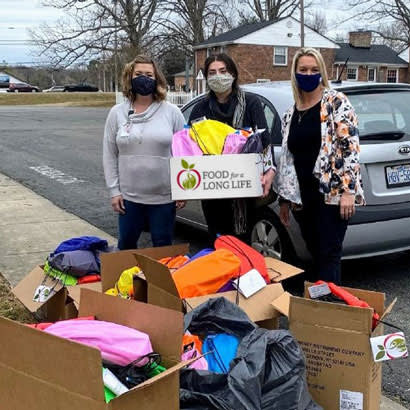
The COVID-19 pandemic has required park and recreation professionals to be more creative than ever in finding solutions to safely provide recreation to their participants. The Food for a Long Life USDA Sustainable Community Project was no exception. Collaborations and partnerships between organizations and universities came together during this difficult time to provide creative and innovative solutions to safely provide recreation, nutrition education and intergenerational opportunities to 120 homebound Centra PACE older adults in Lynchburg, Virginia.
Food for a Long Life (FFLL) is a community-based intergenerational project operating in Ohio and Virginia and funded by a $1.2 million five-year grant from the USDA. Pre-pandemic, FFLL partnered with a local preschool and brought preschoolers into Centra PACE for in-person nutrition-centered intergenerational programming. The pandemic made it unsafe to conduct these recreation programs, requiring FFLL to pivot programming efforts.
FFLL Project Manager and Assistant Professor of Recreation Management and Physical Education at Appalachian State University, Dr. Jill Juris, knew a solution existed in recreation and brought Morgyn Manzer onto the FFLL team as the recreation program coordinator to develop six unique nutrition and recreation packages delivered monthly to 120 homebound Centra PACE older adults in Lynchburg. Package themes included: “Whether & Weather or Not it’s a Soup Night,” “Game Night,” “Green Thumbs Up,” “Puppies Need Water and You Do Too!,” “Wear Your Rainbow and Eat it Too!,” and “Bird is the Word.”
All FFLL Nutrition and Recreation Packages aligned with the project's mission and contained three key components: recreation, nutrition education and intergenerational opportunities. However, packages varied in topic, subject matter, activity and correspondence with preschoolers. In order to implement a well-rounded package, the FFLL team used their strengths, knowledge bases, experiences and professions. Collaboration between recreation, gerontology, nutrition and child development professionals from FFLL staff at Ohio State, Virginia Tech and Appalachian State, as well as PACE staff, Virginia Cooperative Extension and Timberlake Child Development Center staff, was vital to maintaining an exceptional concept.
As a best practice, to evaluate the project and ensure project goals and objectives were being met, brief surveys were sent out along with each package to assess participants’ desires and better match participant needs. However, FFLL found that a series of listening sessions proved to be more effective for this population, and some additional anecdotal feedback was collected. Some participants' comments on what receiving the FFLL Nutrition and Recreation Packages meant to them included: “It was a boost!,” “Greatly appreciated,” “It has given me something to look forward to,” and “Someone was thinking about you.”
Among the benefits reported by participants were that they learned something new and the packages gave them something to do while homebound due to COVID-19. Additionally, they agreed that they enjoyed receiving the preschoolers’ projects, as they made them feel connected.
The most well-received package was “Puppies Need Water and You Do, Too!” which included: an 8” Zoo Factory Dog, a bag of stuffing, wishing star, birth certificate, pre-recorded sound chip for the stuffed dog, drinking cup, True Lemon and True Lime water flavor crystals, wordsearch puzzles featuring various dog breeds, links to dog-related online activities, and nutritional information on the importance of adequate hydration. The recording of the sound chip was the intergenerational component of this package and went as follows, “Hi this is ____, remember to drink your water!” Feedback relayed by PACE staff included, “They are loving the idea of the stuffed puppy that speaks to them!” and “We have seen lots of smiles and heard comments about how cute it is.”
Other intergenerational components made by the preschoolers included: vegetable soup stamped-painting, a list of their favorite games, fingerprint pea bookmark, tie dye suncatcher, green thumbs up fingerprint project and bird watching tally sheet.
In addition to reducing social isolation and promoting healthier overall well-being among older adults, feedback from Timberlake Child Development Center staff suggested the preschoolers also benefited from their involvement by being informed that they were making these various projects for their “grandfriends.” They seemed to have a better understanding of their contribution to the project with each additional package. Timberlake Child Development Center staff and preschoolers expressed having fun and had an overall positive attitude towards their involvement with the program. Similar attitudes were expressed by PACE staff and participants.
Parks and recreation serves youth and older adult populations, but often programming remains segregated. Intergenerational programming is overlooked by many recreation providers. Along with other available intergenerational resources such as toolkits from Generations United and online continuing education through Ohio State’s College of Social Work, FFLL staff is eager to share the package ideas with park and recreation professionals to support others in creating more intergenerational community recreation. Park and recreation professionals can better serve their communities by promoting intergenerational connections.
Dr. Jill Juris is the FFLL Project Manager and Assistant Professor of Recreation Management and Physical Education at Appalachian State University.
Morgyn Manzer is a Recreation Program Coordinator with Food for a Long Life.

